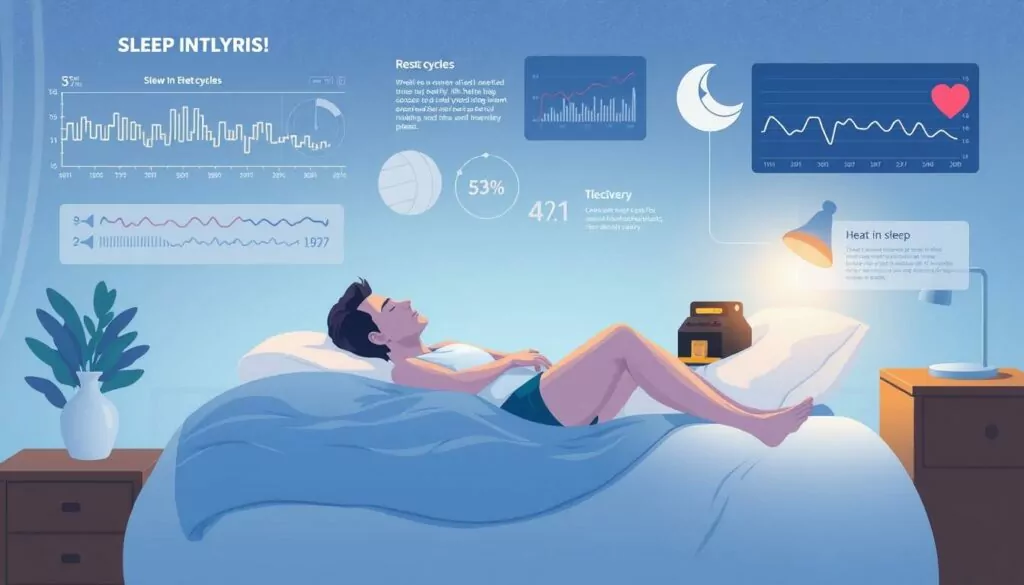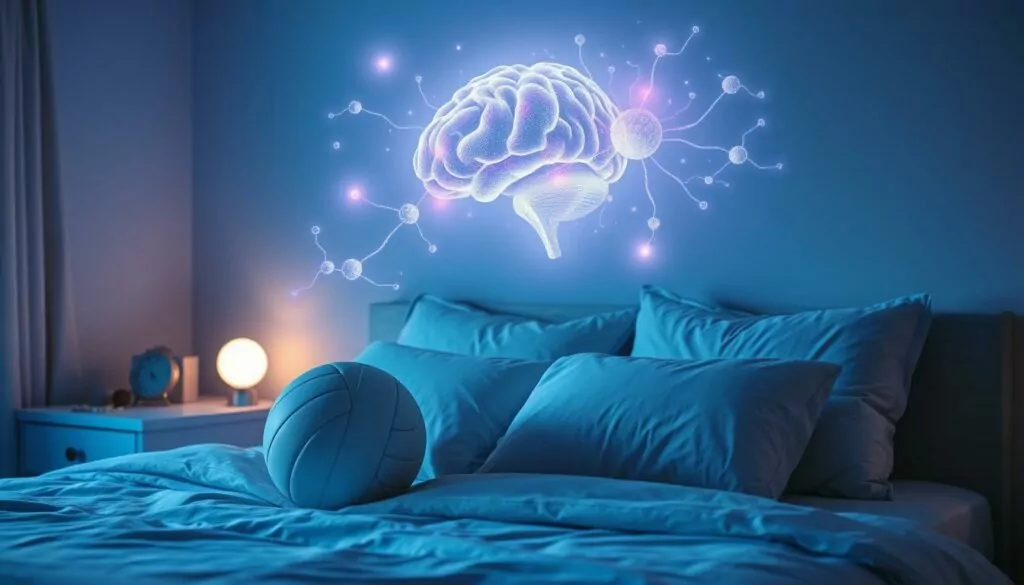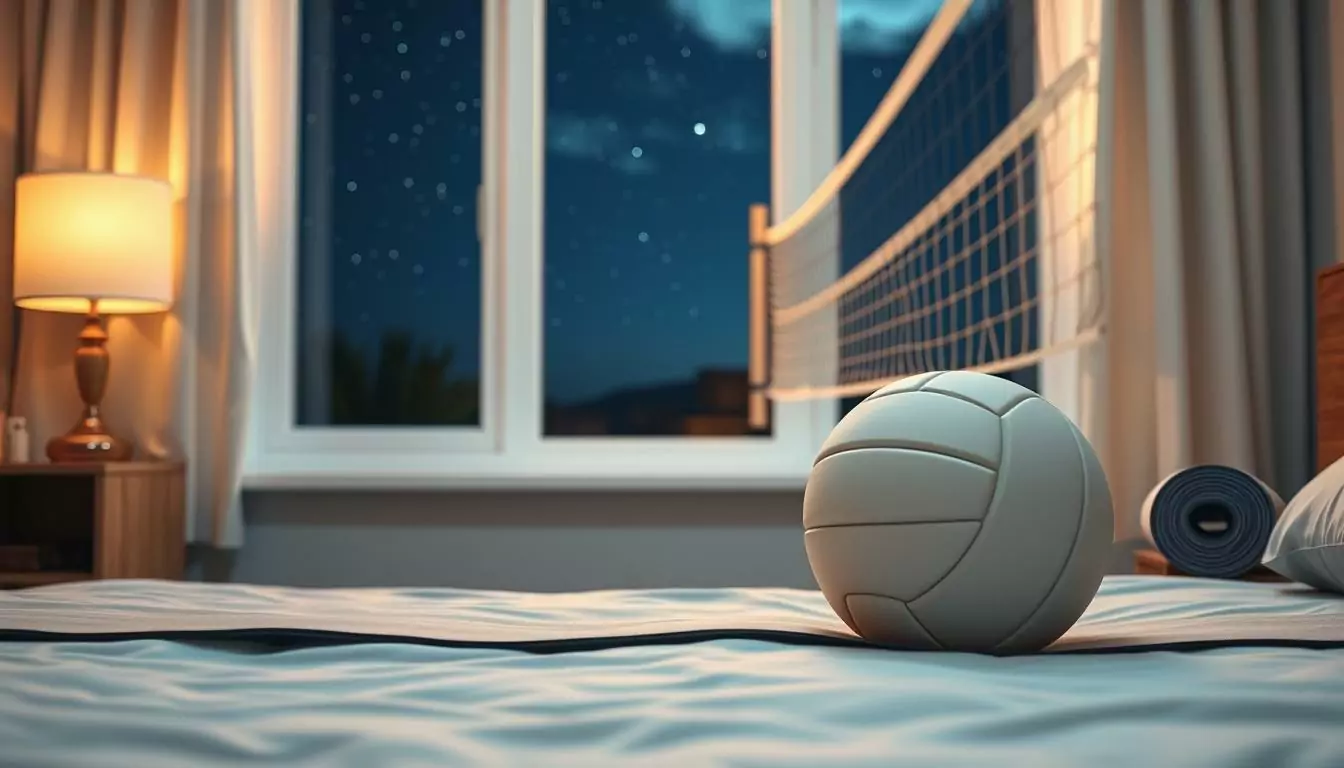Extending sleep to 10 hours improved basketball players’ shooting accuracy by 9%. This fact shows how vital sleep is for athletes. For volleyball players, better sleep can greatly boost your performance.
Volleyball sleep optimization is more than just sleeping longer. It’s a strategy to enhance your game. Quality sleep can improve reaction times and decision-making. It can even make your serves more accurate.
Your body repairs and grows during deep sleep. This is crucial for the physical demands of volleyball. Good rest can make you sprint faster and serve better.
It can also improve team dynamics. Proper sleep reduces injury risks, helping you stay in the game longer.
Want to spike your performance? Let’s explore sleep optimization for volleyball excellence. You’ll learn how rest can help you become the athlete you’ve always wanted to be.
Key Takeaways
- Extending sleep to 10 hours can significantly improve athletic performance
- Quality sleep enhances reaction times, decision-making, and serve accuracy
- Deep sleep stages are crucial for muscle repair and growth
- Proper rest reduces injury risks and improves overall physical performance
- Sleep optimization can lead to better team dynamics and emotional regulation
Understanding Sleep’s Impact on Athletic Performance
Sleep is vital for sports performance. Volleyball players need rest for recovery and peak performance. Research shows that 42% of student athletes report poor sleep regularly. This can seriously affect their game.
The Science Behind Sleep and Sports Performance
Sleep is when your body repairs itself. For volleyball players, this is crucial. During deep sleep, muscles heal and grow stronger.
Your brain also processes new skills learned during practice. Studies reveal some surprising facts about sleep and performance.
- Athletes who sleep less than 8 hours a night are 1.7 times more likely to get injured
- Lack of sleep can slow down reaction times and decision-making skills
- Well-rested athletes run faster and serve more accurately
Sleep Cycles and Athletic Recovery
Sleep cycles are key for volleyball players. Each cycle lasts about 90 minutes. It includes light, deep, and REM sleep.
Deep sleep is when most physical recovery happens. REM sleep helps with mental sharpness and skill memory.
Here’s how sleep affects different aspects of performance:
| Sleep Duration | Impact on Performance |
|---|---|
| Less than 6 hours | Decreased reaction time, higher injury risk |
| 7-9 hours | Improved speed, accuracy, and decision-making |
| 10+ hours | Enhanced sprint times, better serve accuracy |
Good sleep habits can boost your game. Stick to a regular sleep schedule, even on weekends. Create a cool, dark, quiet sleeping environment.
Avoid screens before bed to help your body relax naturally. These simple steps can improve your sleep and performance.
Sleep Quality Metrics for Volleyball Athletes

Sleep quality metrics are vital for volleyball athletes seeking to boost their performance. Recent research highlights how sleep efficiency impacts sports, especially volleyball.
Measuring Sleep Efficiency
Sleep efficiency metrics offer crucial insights into an athlete’s rest quality. A study of 30 female volleyball players, around 17 years old, revealed interesting sleep patterns.
The study found 18 players with high Social Jetlag (HSJL) and 12 with low Social Jetlag (LSJL). It also identified 10 Evening-types, 3 Morning-types, and 17 Neither-types.
LSJL players showed better performance in afternoon Vertec Jump Tests compared to morning sessions. This finding underscores how sleep patterns affect athletic performance.
Understanding Sleep Stages for Athletes
Athletic sleep cycles are crucial for recovery and performance. A review of 31 studies on volleyball athletes revealed some concerning trends.
18% of athletes faced at least two high-risk sleep factors. 9% slept less than 6 hours daily, while 30% were unhappy with their sleep quality.
These findings stress the importance of prioritizing sleep quality for volleyball players. Understanding individual sleep stages is key to achieving peak performance.
Recovery Sleep Protocols for Elite Performance
Sleep is vital for athletic performance. Volleyball players can achieve peak performance by mastering recovery protocols and sleep banking strategies. Let’s explore how to optimize your sleep for better athletic outcomes.
Post-Match Sleep Optimization
After an intense volleyball match, your body needs quality rest to recover. Athletes who sleep less than 8 hours face a higher risk of sports-related injuries.
To optimize your post-match sleep, aim for at least 9 hours. Create a cool, dark sleeping environment. Avoid screens for an hour before bed.
Practice relaxation techniques like deep breathing to enhance your sleep quality.
- Aim for at least 9 hours of sleep
- Create a cool, dark sleeping environment
- Avoid screens for an hour before bed
- Practice relaxation techniques like deep breathing
Sleep Banking Strategies
Sleep banking helps you prepare for periods of sleep loss. It’s useful for volleyball players during tournament seasons.
To implement sleep banking, gradually increase your sleep time by 30-60 minutes per night. Do this in the week leading up to a tournament.
Maintain a consistent sleep schedule. Use strategic naps (20-30 minutes) to supplement nighttime sleep.
- Gradually increase your sleep time by 30-60 minutes per night in the week leading up to a tournament
- Maintain a consistent sleep schedule
- Use strategic naps (20-30 minutes) to supplement nighttime sleep
Quality sleep is as important as your training regimen. Prioritizing these recovery protocols sets you up for success. You’ll achieve peak performance and excel on the volleyball court.
Sleep Hygiene Best Practices for Athletes
Sleep hygiene is vital for volleyball players and athletes. Good sleep habits boost recovery and athletic performance. Effective sleep practices can make a big difference.
Creating the Optimal Sleep Environment
For better sleep, focus on your bedroom setup. Keep it quiet, dark, and cool. Aim for temperatures between 60-67 degrees Fahrenheit.
Avoid electronic devices before bed. Their blue light can mess with your sleep cycle.
Research shows athletes often struggle with sleep quality. A good sleep environment helps you get 8-10 hours of rest. This amount is key for health and performance.
Evening Routines for Better Rest
A steady pre-sleep routine is crucial for athletic sleep hygiene. Try these practices:
- Engage in gentle stretching or yoga before bed
- Practice mindfulness meditation to reduce stress and improve focus
- Limit meals in the evening to nutrient-dense choices
- Avoid caffeine and high-sugar foods at least 4 hours before bedtime
- Implement a technology detox an hour before sleep
Deep sleep helps repair tissues, grow muscles, and boost immunity. These sleep habits will help you perform better and recover faster.
Managing Sleep During Competition Seasons

Sleep is vital for volleyball performance during competitions. Mastering competition sleep preparation keeps you at your best. Let’s explore how to optimize rest during these intense periods.
Travel and Sleep Adaptation
Volleyball competitions often involve travel, disrupting sleep patterns. Adjust your sleep schedule gradually before trips. Aim to align with your destination’s time zone.
Pack sleep essentials like earplugs, an eye mask, and comfy sleepwear. These items help create a familiar sleep environment anywhere you go.
Pre-Game Rest Strategies
Effective pre-game rest can boost your court performance. Set a consistent bedtime routine to signal your body it’s time to relax. Avoid screens an hour before sleep to prevent blue light interference.
Try relaxation techniques like deep breathing or gentle stretching. These methods prepare your body and mind for restorative sleep.
Quality sleep is as important as physical training. The Arizona State University women’s volleyball team’s success highlights this fact. They finished 28-7 overall and earned an NCAA tournament berth.
“Integrating sleep and nutrition into the team’s routine is crucial for optimal performance,” – Jake Garrity, Assistant Sports Performance Coach.
Use these travel and sleep adaptation techniques. Apply pre-game rest strategies too. You’ll manage sleep better during competition seasons, improving performance and recovery.
Mental Performance and Sleep Connection

Sleep is vital for volleyball mental performance. Good rest sharpens decision-making and focus on the court. Let’s explore how sleep affects your game and improves your mental edge.
Cognitive Benefits of Quality Sleep
Well-rested volleyball players have better reaction times and decision-making skills. Athletes who sleep 7-9 hours nightly excel in high-intensity actions. These include repeated jumps and quick directional changes.
- Slower sprint times
- Decreased accuracy in serves (up to 53%)
- Quicker exhaustion
- Impaired learning and decision-making
Focus and Decision-Making Enhancement
More sleep can boost your on-court performance significantly. Athletes who sleep 10 hours a night see remarkable improvements. These include faster sprints and better shooting accuracy.
- Faster running speeds during sprints
- Improved shooting accuracy (9% increase in free throws)
- Quicker reaction times
- Enhanced focus throughout the game
Use tools like the Pittsburgh Sleep Quality Index (PSQI) to track your sleep patterns. This cost-effective method can help you improve your sleep routine.
| Sleep Duration | Performance Impact |
|---|---|
| 7-9 hours | Optimal cognitive function |
| 10 hours | Enhanced athletic performance |
| Less than 7 hours | Decreased reaction time, focus |
Prioritizing sleep unlocks your full potential on the volleyball court. Focus on sleep quality and duration for better mental game. This leads to improved overall performance.
Sleep Duration Guidelines for Peak Performance

Sleep is vital for athletes to reach their full potential. It helps with recovery, performance, and overall health. Let’s explore optimal sleep timing and napping strategies for athletes.
Optimal Sleep Timing for Athletes
Volleyball players should aim for 7-9 hours of sleep nightly. Elite athletes often need at least 9 hours to support intense training.
Research shows good sleep quality leads to lower tension and better game outcomes. Align your bedtime with your body’s natural rhythms for best results.
Stick to consistent sleep and wake times, even on rest days. This helps maintain your body’s natural sleep cycle.
Strategic Napping Protocols
Napping can boost an athlete’s performance. Short naps of 20-30 minutes can increase alertness, especially before early practices or late games.
Consider these napping strategies:
- Power nap: 10-20 minutes for a quick energy boost
- Recovery nap: 30-60 minutes to enhance physical recovery
- Pre-competition nap: 90 minutes, timed to end about 3 hours before the event
Timing is crucial for naps. Avoid napping too close to bedtime. It may disrupt your nighttime sleep quality.
| Age Group | Recommended Sleep Duration |
|---|---|
| 6-13 years | 9-11 hours |
| 14-17 years | 8-10 hours |
| 18-64 years | 7-9 hours |
Follow these guidelines to improve your sleep patterns. Pay attention to your body’s needs. This will boost your athletic performance and overall well-being.
Conclusion
Volleyball sleep optimization can transform an athlete’s performance. Quality rest goes beyond just sleeping longer. It’s about smart sleep management that fits your training schedule.
By using these techniques, you can boost your game with athletic recovery sleep. This approach needs personal adjustments and regular practice. Listen to your body and tweak your sleep habits as needed.
Sleep strategies can help with travel tiredness or pre-game nerves. They keep you alert and physically ready. Making sleep a key part of training sets you up for success.
Better sleep leads to quicker reactions and smarter decisions. It also helps your body recover faster. As you improve your sleep habits, you’ll see gains in your game and overall health.
